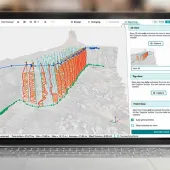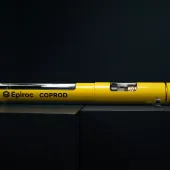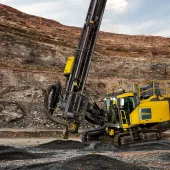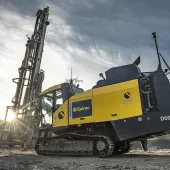Bridge Abrasives outline the case for the re-grinding of worn drill bits

First published in the March 2014 issue of Quarry Management as Right on the Button
Currently celebrating their twenty-first year in business, Bridge Abrasives Ltd, based in Totnes, Devon, specialize in the manufacture of metal-bonded diamond and borazon grinding and sharpening tools for the drilling, engineering and woodworking industries.
In particular, the company supplies its hand-held air grinder and diamond grinding cups to the quarry drilling sector to re-profile worn tungsten-carbide button bits and down-the-hole (DTH) hammers.
According to Bridge Abrasives, the most important factor contributing to premature drill bit failure and poor performance is ‘over-drilling’ or operating beyond the reconditioning point. Failure to re-grind in time can prove costly as buttons with ‘flats’ will cause penetration rates to fall by up to 20%.
Regular re-sharpening extends the life of button bits and maintains maximum penetration rates. Button bits should be inspected regularly and re-ground when the following conditions occur:
- The development of ‘alligator skin’ patterns on the surface of the button. This is caused by excessive local heating during drilling and if allowed to develop will cause the buttons to disintegrate.
- The ‘flats’ worn on the buttons exceed one-third of the diameter of the button.
Care should be taken not to grind away too much of the button height; if necessary, a little of the ‘flat’ can be left. Chipped buttons should be ground smooth and broken-off buttons should be ground flush with the bit body.
Bridge Abrasives’ service pack (portable air preparation unit) brings re-grinding to the rock face. This speedy, easy-to-use and highly cost-effective system has been specially developed to recondition worn DTH button drill bits, markedly increasing their life whilst helping to eliminate hole deviation. It consists of an air-pressure regulator and gauge, in-line oiler, water sump with connectors and hoses, and a coolant regulator, all contained in a sturdy metal box with safety equipment. The tried and tested air grinder (which can be supplied with or without the service pack), has been slightly modified over the years to produce a lighter, more durable and efficient machine.
Bridge Abrasives say that, over the last 20 years or so, they have noticed a shift away from the ‘two-step’ method of re-grinding, involving the use of a shaped diamond cup (hemispherical, ballistic, semi-ballistic, conical, parabolic etc) to re-profile the button itself and a boroscan cup to remove the steel body away from the button, to the ‘one-step’ method involving the use of a combination-type cup which does both jobs at the same time, thus reducing downtime.
‘There is no doubt that the introduction of cheap ‘throw-away’ drill bits has affected the market over the years, but quality button bits and the use of our re-grinding tools to re-profile the bit for reuse is still far more cost-effective for the discerning driller,’ commented Bridge Abrasives director Julie Frost.
Bridge Abrasives have recently supplied re-grinding equipment to Hausherr System Bohrtechnik (Bauer Group) for a €2 million (US$2.6 million) drilling project in Uzbekistan. The company also specializes in the manufacture of resin-bonded diamond and borazon (CBN) grinding wheels and tools that are used to sharpen the tungsten carbide, high-speed steel (HSS) and stellite saw blades used in the woodworking industry. In the engineering, automotive and medical sectors, the company’s products grind many different materials including tungsten carbide, tool steels, laminates and carbon graphites.
All Bridge Abrasives’ products are tailored to meet customers’ individual requirements and the company continually invests in new machinery, such as the recent purchase of a new XYZ three-axis CNC milling machine which allows for more accurate manufacturing methods. For further information visit: www.bridge-abrasives.co.uk
- Subscribe to Quarry Management, the monthly journal for the mineral products industry, to read articles before they appear on Agg-Net








